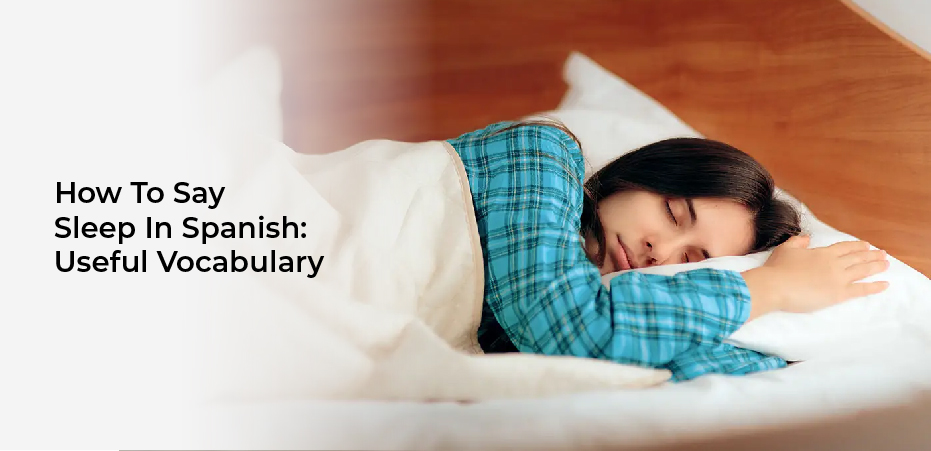Are you planning a trip to a Spanish-speaking country and want to be able to communicate about sleep and bedtime? Or maybe you are learning Spanish and want to expand your vocabulary related to sleep. Whatever your reason may be, learning how to say sleep in Spanish and other related terms is essential.
In this article, we will provide you with useful vocabulary, expressions, and phrases to help you talk about sleep in Spanish.
Firstly, we will cover vocabulary related to sleep, such as ‘dormir'(to sleep), ‘insomnio'(insomnia), ‘sueño'(dream), and ‘almohada'(pillow). Then, we will provide you with expressions and phrases commonly used when talking about sleep, such as ‘¿Cómo dormiste?'(How did you sleep?), ‘Tengo sueño'(I am sleepy), and ‘ir a la cama'(to go to bed).
We will also discuss cultural aspects of sleep in Spanish-speaking countries, such as siestas and bedtime routines. With this knowledge, you will be able to communicate about sleep in Spanish with ease.
Vocabulary for Sleep-related Terms in Spanish
Looking to improve your Spanish vocabulary for talking about sleep? Check out these essential terms!
First off, the most basic word for sleep in Spanish is ‘dormir.’ You can use it in different ways, such as ‘Voy a dormir’ (I’m going to sleep) or ‘Estoy durmiendo’ (I’m sleeping).
Another useful term is ‘sueño,’ which means ‘dream’ or ‘sleepiness.’ For example, you can say ‘Tengo mucho sueño’ (I’m very sleepy) or ‘Tuve un sueño extraño’ (I had a strange dream).
Additionally, ‘insomnio’ refers to the inability to sleep, while ‘pesadilla’ is the word for ‘nightmare.’
By knowing these terms, you’ll be able to express your sleeping habits or troubles in Spanish, and even talk about your dreams.
Expressions for Talking about Sleep in Spanish
You can’t deny the feeling of frustration when you can’t find the right words to describe how exhausted you are after a sleepless night, but with these expressions for talking about sleep in Spanish, you’ll be able to convey your emotions with ease.
Firstly, you can use the phrase ‘tener sueño’ which means ‘to be sleepy’ to describe your current state. For example, you can say ‘tengo mucho sueño’ which translates to ‘I’m very sleepy.’
Another expression that you can use is ‘dormir como un tronco’ which literally means ‘to sleep like a log.’ This is a common phrase used to describe deep and uninterrupted sleep.
You can also use the phrase ‘echar una siesta’ which means ‘to take a nap.’ This is a popular practice in Spanish-speaking countries, where people take a short break in the afternoon to rest and recharge.
By using these expressions, you’ll be able to communicate effectively about your sleep-related experiences in Spanish.
Discussing Sleep Patterns and Habits in Spanish
When talking about your sleep patterns and habits in Spanish, it’s important to be able to use reflexive verbs such as ‘levantarse’ (to wake up) and ‘acostarse’ (to go to bed) to discuss your routine.
For example, you could say ‘Me levanto a las seis de la mañana’ (I wake up at 6am) or ‘Me acuesto temprano todas las noches’ (I go to bed early every night).
It’s also common to use phrases like ‘dormir bien’ (to sleep well) or ‘dormir mal’ (to sleep poorly) to describe the quality of your sleep.
You could say ‘Necesito dormir bien para estar en mi mejor estado’ (I need to sleep well to be at my best) or ‘Últimamente he estado durmiendo mal y me siento cansado’ (Lately I’ve been sleeping poorly and I feel tired).
By being able to discuss your sleep patterns and habits in Spanish, you’ll be able to communicate with others about your rest and well-being.
Common Phrases for Wishing Goodnight in Spanish
As you prepare to rest for the night, don’t forget the power of wishing someone a peaceful ‘buenas noches’ – it can bring comfort and warmth to those around you.
In Spanish-speaking countries, it’s common practice to say goodnight to family members, friends, or even strangers before going to bed. Saying ‘buenas noches’ is a way to show affection and respect for the people around you.
Aside from ‘buenas noches’, there are other common phrases you can use to wish someone a goodnight in Spanish. You can also say ‘que descanses bien’ which means ‘may you rest well’. Another phrase is ‘dulces sueños’, which translates to ‘sweet dreams’.
These phrases are a simple but effective way to show that you care for the people around you and their well-being as they prepare to sleep.
So, don’t forget to wish your loved ones a peaceful night before you go to bed tonight!
Exploring Cultural Aspects of Sleep in Spanish-Speaking Countries
Exploring the cultural aspects of sleep in Spanish-speaking countries reveals fascinating insights into the significance of rest and relaxation in their daily lives.
In many Latin American countries, the siesta is a common practice. This midday nap is an integral part of their culture, and it reflects the importance of rest and taking a break from work. It’s not unusual for businesses to close during the afternoon to allow employees to go home and rest.
The siesta is not only a time to recharge physically, but it’s also a time to connect with family and friends. It’s a social activity that strengthens relationships and fosters a sense of community.
In addition to the siesta, bedtime routines are also an important part of the culture in Spanish-speaking countries. Families often gather together at night to share stories, watch TV, or simply relax. This time together is an opportunity to wind down and prepare for a good night’s sleep.
It’s also common for children to sleep in the same room as their parents, as family bonds are highly valued in these cultures.
Overall, the cultural aspects of sleep in Spanish-speaking countries demonstrate the importance of rest and relaxation in their daily lives, as well as the value of social connections and family relationships.
Frequently Asked Questions
What are some common sleep disorders in Spanish-speaking countries?
You may be interested to know that some common sleep disorders in Spanish-speaking countries include insomnia (insomnio), sleep apnea (apnea del sueño), and restless leg syndrome (síndrome de piernas inquietas).
How does sleep hygiene differ in Spanish-speaking cultures compared to others?
Sleep hygiene can differ in Spanish-speaking cultures, but generally emphasizes a consistent sleep schedule, avoiding stimulants before bed, and creating a comfortable sleep environment. It’s important to prioritize good sleep habits for overall health and well-being.
Are there any traditional remedies for sleep problems in Spanish-speaking countries?
Looking for traditional remedies for sleep problems in Spanish-speaking countries? Try sipping chamomile tea or taking a warm bath before bed. You could also try aromatherapy with lavender oil or practicing relaxation techniques like deep breathing.
What are some cultural beliefs and superstitions related to sleep in Spanish-speaking communities?
In Spanish-speaking communities, there are various cultural beliefs and superstitions related to sleep. You might hear about the importance of sleeping with your head facing a certain direction, or about the significance of certain dreams.
How do Spanish-speaking countries approach sleep in the workplace or school settings?
In Spanish-speaking countries, it’s common to take a midday siesta or “siesta”to rest and recharge. Some workplaces and schools may even have designated nap areas. However, this practice varies by region and culture.
Conclusion
Congratulations! You now know how to talk about sleep in Spanish. With the vocabulary and expressions we covered, you can confidently discuss your sleep patterns and habits, and wish your Spanish-speaking friends a good night’s sleep.
Additionally, understanding the cultural aspects of sleep in Spanish-speaking countries can help you appreciate the importance of rest and relaxation in these cultures.
Keep practicing your Spanish and don’t forget to prioritize a good night’s sleep for yourself too! ¡Buenas noches!


